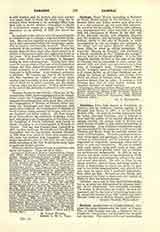

Camargo, DIEGO MUNOZ (according to Beristain de Souza, Munoz should be the surname) b. of a Spanish father and Indian mother soon after 1521; d. at a very advanced age, the exact date unknown. He acquired the knowledge of letters and rudimentary acquaintance with other branches of learning from the Franciscans at Mexico in the first half of the sixteenth century, and diligently inquired into the traditions and antiquities of the Nahuatl Indians, chiefly of the tribe of Tlaxcala, in which investigations he was encouraged and sustained by the clergy and the higher Spanish officials. For many years he acted as official interpreter. He wrote the “Historia de Tlaxcala“, first published in a French translation in the “Annales des voyages” and but lately in the Spanish original. It is the only chronicle specially devoted to the past of the tribe of Tlaxcala thus far accessible in print, except one, printed 1870, and which may yet prove to be a fragment of Camargo’s work. Torquemada’s “Monarquia” is largely based on Camargo, and the history is of course partial, as all tribal chronicles are, extolling the Indians of Tlaxcala; and placing them above all others of Nahuatl stock. This does not, however, detract from its value. It presents a view differing from that of other Indian writers, and furnishes elements of useful criticism.
AD. F. BANDELIER

